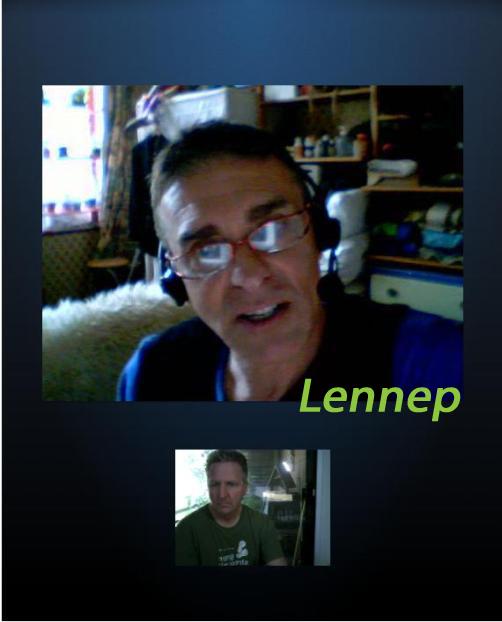Video Conversations in Permaculture & Transitions with Willi Paul. Guest: Erik van Lennep, tepuidesign.com, Ireland. 5-19-11. Sponsored by sacredpermaculture.net & openmythsource.com
Video Conversations in Permaculture & Transitions with Willi Paul. Guest: Erik van Lennep, tepuidesign.com, Ireland. 5-19-11. Sponsored by
sacredpermaculture.net &
planetshifter.com.
Enjoy the Journey and the Conversation with Erik & Willi!
* * * * * * *
Show Notes
Erik van Lennep, Ireland
http://tepuidesign.com
http://erikvanlennep.com
erik at tepuidesign.com
SKYPE = green.heart
http://erikvanlennep.com
http://www.linkedin.com/in/erikvanlennep
www.tepuidesign.com
Topics for Us: - Sacred?
- Are you an alchemist?
- How do we learn to be mystical? Is this a pre-ordained or DNA source in humans?
- If permaculture is a tool kit, sacred is a -?
- What are the emerging symbols in the global narratives of permaculture?
- We are story-tellers and toolmakers. Maybe the dichotomy starts there. But it should be a synthesis, not a division.
- Who or what are the forces opposing permaculture?
- Is permaculture a top-down, male dominated movement?
- How do we work with the feminine to create, as you say, the new paradigm?
- Can we find ways to connect the web permies with the soil permies?
Erik's Writings From LinkedIn Permaculture Supporter Group -
http://www.linkedin.com/news?viewArticle=&articleID=487667244&gid=105358&type=member&item=51559612&articleURL=http%3A%2F%2Fwww.planetshifter.com%2Fnode%2F1855&urlhash=Ofmp
Hi all, I think that despite various people being a bit uncomfortable with the revival of a more spiritual aspect to the complex of measures and drivers which move Permaculture along...and deepen it... that it is not only important to many (witness responses here, but as well "out there"), but comprises a serious and important subset of tools in our toolbox as designers and educators.
The thing is, spirituality differs from dogma and codified religious frameworks because it is personal. Sure, lots of people take it to a "woo-woo" level, but that's more about their need for mystery in their lives and connection to something which feels bigger than their problems. It's also about wanting to belong to communities of like-minded people, which funnily enough often define themselves as individualistic and anti-establishment (join "us", not "them"). But that's part of the human condition and subject for a discussion elsewhere. And if you look with a questioning mind, you can actually find a parallel amount of slavish devotion and blind faith (woo-woo) given over to standard economics theory and practice, analytic laboratory processes, allopathic medicine, chemical agriculture, GMO development..... Because that's what we humans do.
What I have found to be important about having a spiritual connection, both from my own life and what I've seen in others many times, is the increased sensitivity it can bring to the observer. And we all know that a significant percentage of being a good designer, farmer, gardener, teacher, forester....most things in fact, is paying attention. It's observation. When I teach gardening, I help people discover that when they match knowledge of the needs of the plants (and their communities) with careful observation, you become a good gardener. I teach pretty much the same idea when I train designers, or teach sustainable development.
Spirituality, in its essence, is about feeling an intuitive connection to the world around you. From that people derive meaning, turn it into mysticism, become Einsteins, or whatever else is compelling them. The reason it's so powerful is that stems from the part of our awareness ...our consciousness...our mental and perceptive activity if you prefer those terms.... but the part of our awareness which actually makes up some 80% of our thoughts and perceptions. It's far deeper and more powerful than the logical faculties, but we have an entrenched cultural bias towards the logical 20% which discounts the majority
//
From his Sacredpermaculture.net post
- I have been involved with the promotion of sustainability since before it had a name, and with permaculture since I co-presented Bill Mollison's first workshop in New England, North America. (just to give some perspective). So I've been looking at and un-picking the tangle for a long time. I keep coming back to the need for attitude change and for psychological and local-political interfaces. We have to internalise these values and issues if we want to see genuine and deep change happen.
I am a mix of mystic and pragmatist, or maybe a pragmatic mystic? Mystic pragmatist? I don't know; it's just a label at the end of the day. But what I do know is that we all have our own routes into our awareness and our motivation. Some take the "practical avenue", others take the "philosophical" route. What would be good to remember is that these are each just different aspects, different windows into something larger and more integrated. There is no conflict in reality, whether you prefer to think and talk about pragmatics or underlying energies. Because they co-exist.
Something I do believe very strongly, and have reinforced through experience, is that close to the core of our species, we are story-tellers and toolmakers. Maybe the dichotomy starts there. But it should be a synthesis, not a division.
Shamanism, or the shamanic perspective, is in many ways about being able to see and to work with the basic energy behind all form and action. It sounds mystic, but only if you prefer to stay in the realm of the mysterious. In fact quantum science has verified much of what traditional mystics, including shamans, have said for ages. It's all connected, everything communicates on an energetic level. Energy underlies form.
How do we facilitate or mid-wife the birth of a new paradigm? How do we help others understand what Permaculture and sustainability are saying? Of course, we tell stories. And people listen. Whether or not they know it. And deeply-down to the core of their beings.
If we can tell a good story about a fantastic tool? Hey! We have it covered. And that in many ways is the Permaculture story.
Find the meta-tools at the openmythsource – reservoir facebook

